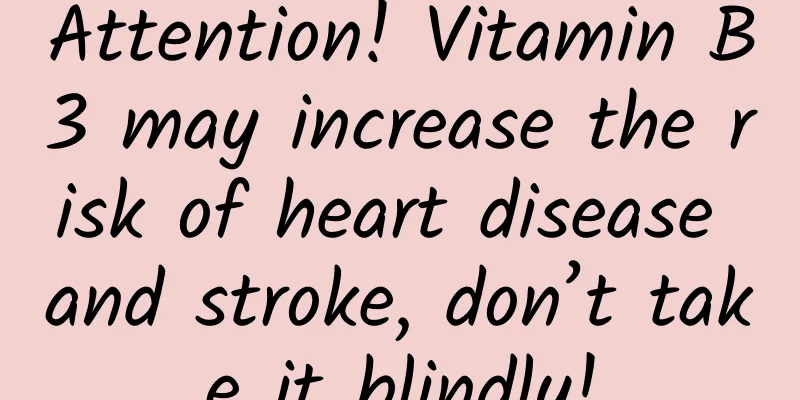Attention! Vitamin B3 may increase the risk of heart disease and stroke, don’t take it blindly!

|
As the public's awareness of health gradually improves, supplementing "nutritional products" to improve immunity has become a very popular lifestyle for modern people, and various vitamins and their derivatives have become hot-selling products in recent years. At present, although there is no authoritative research to confirm the publicity effect of these health products, the global market share of vitamin-related health products has exceeded US$25 billion. Is vitamin supplementation really good for health? Excessive vitamin B3 may increase risk of heart attack and stroke Recently, a new study published in Nature Medicine found that people with high levels of niacin in their blood may be more likely to have a heart attack or stroke than those with low levels . Niacin, also known as vitamin B3, is a precursor of nicotinamide adenine dinucleotide (NAD) and nicotinamide adenine dinucleotide phosphate (NADP). It has anti-inflammatory, antioxidant and lipid-lowering effects. It is a popular supplement and is often added to fortified foods that can be taken as supplements, but excessive vitamin supplementation may cause blood vessel inflammation. In the past few decades, heart attacks and strokes have been the leading causes of death among the global population. Although researchers have made significant progress in discovering risk factors for these diseases, they have not yet reached a complete conclusion. Therefore, although vitamin niacin is an essential micronutrient, its role in cardiovascular disease is still unclear. "If you treat high cholesterol, high blood pressure and diabetes, and eliminate all existing risk factors, a heart attack may still occur, which means we are missing something." said Stanley Hazen of the Cleveland Clinic in the United States, the corresponding author of the paper. To fill these gaps, Hazen and colleagues collected blood samples from 2,331 adults in the United States and 832 adults in Europe who chose to undergo cardiovascular screening. The team analyzed the samples for substances called metabolites, which are byproducts of metabolic processes such as digestion. The researchers then tracked the participants for more than three years to see if they had any heart conditions, such as heart attacks and strokes. In two validation cohorts, serum levels of N1-methyl-2-pyridone-5-carboxamide (2PY) and N1-methyl-4-pyridone-3-carboxamide (4PY), the end metabolites of excess niacin, were associated with an increased risk of major adverse cardiovascular events over 3 years. The results found that people with higher blood levels of a metabolite called 4PY were, on average, 60% more likely to experience such events than those with lower levels. 4PY is produced only when the body breaks down excess vitamin B3. Further experiments showed that 4PY inflamed the rodents' blood vessels. "We know that inflammation is a major factor in heart disease," Hazen explains. It is not uncommon for people to have high levels of vitamin B3 in their bodies. This is partly due to certain foods, such as cereals and flour, to which countries including the UK and the US often add the vitamin. Vitamin B3 supplements have become increasingly popular because of evidence that it has anti-aging benefits, Hazen said. In addition, until recently, doctors stopped prescribing high doses of vitamin B3 to people at risk for cardiovascular disease because the vitamin was initially thought to protect people from those conditions by lowering cholesterol. "This study focused on people of European descent. It's unclear whether similar results would be seen in people of different racial or ethnic backgrounds," said Northwestern University's Jenny Jia. Most people don't need extra vitamin supplements. If a normal person's daily diet includes meat, eggs, milk, vegetables and fruits, they will generally not lack certain vitamins. Unless there are some special circumstances, such as after getting sick, the gastrointestinal tract has poor absorption and the ability to absorb vitamins has weakened, then there will be a situation where vitamins are lacking even if the diet is very balanced. There is also a group of people whose gastrointestinal function is not affected, but who need more vitamins than before, the most typical of which are pregnant women and breastfeeding mothers. In addition, some special types of workers, such as steel workers who work in high temperature environments all year round, are special groups that are at high risk and prone to vitamin deficiency. These groups should supplement vitamins as soon as possible. According to the "Dietary Guidelines for Chinese Residents", it is recommended that each person consume more than 12 kinds of food a day and 25 kinds of food a week, based on grains. Combined with the necessary intake of fruits, vegetables and protein, most people do not need additional vitamin supplements. |
<<: How did Yunnan become the coffee capital of China? It all started with a "lost book"...
>>: International Seal Day丨How did the spotted seal, a shore “larvae”, become a diving champion?
Recommend
Switching to the "Google Model": Alibaba's new path for home Internet
The concept of home Internet continues to be popu...
JD Power: COVID-19 pandemic makes drivers more loyal to the brands they already own
The auto industry has changed dramatically during...
Lemongrass, the lifelong enemy of some people
When it comes to ingredients that are “one man’s ...
A large number of information flow delivery optimization tips and tools are coming!
Launching is a big project! Are you always overwh...
How many years can a mobile phone last? Three main factors determine the lifespan of a mobile phone
[[429168]] Computers have a history of developmen...
Hot, hot, hot! How to prevent heat stroke in high temperatures? Learn more in one article
Yesterday Guizhou, Hunan, Hubei, Anhui, Jiangsu a...
Understand in one article how to build various user incentive systems?
Excellent user operation is to add a suitable use...
Talk from 8 perspectives: Channel delivery methods based on user journey
The user journey refers to the entire process of ...
Apple's event takes place this week: What to expect this year
The highly anticipated Apple conference will be h...
Tieniu Sexual Happiness Private Lesson
1. Xfu Private Training [Endurance Improvement Co...
Taking advantage of "Transformers 5", a comprehensive review of brand IP marketing
This year marks the tenth anniversary of the rele...
How much does it cost to be an agent for a home furnishing mini program in Fuxin?
How much does it cost to be an agent for a home f...
How to make your "promotional activities" a big hit?
Everyone should have had this feeling: when you a...
Are you happy after quitting smoking? Using my own experience, I will tell you the truth about smoking
This question is a bit complicated. Whether you a...









